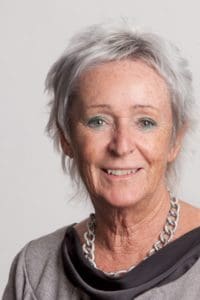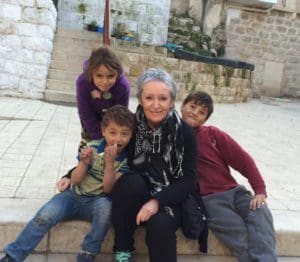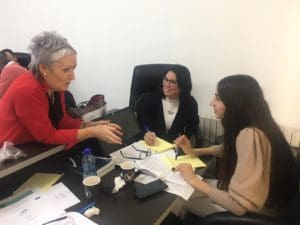Giving People a Voice. Member Spotlight: Gerry O’Sullivan
Giving a voice to those who do not have one. This is the main guiding principle connecting all the events in the life of Gerry O’Sullivan, as well as the element constantly motivating her passion for mediation. Gerry counts more than 30 years as a facilitator and trainer. She is also an accredited mediator with expertise in community, workplace, family and civil and commercial mediation. She is the founder and director of O’Sullivan Solutions, her personal firm delivering high-quality Certified Professional Mediation Training accredited by the Mediators’ Institute of Ireland. Besides, Gerry holds a role in the Panel of MBB Consulting, MBBI’s consultancy branch providing conflict management and stakeholder engagement services to companies and governments around the world.
From training in parenting and personal development…
 Differently from many mediators, Gerry has no educational background in law or similar, but she is trained in adult education focused on community development. At that stage of her career neither was she involved with the world of conflict resolution. However, managing conflict arose unexpectedly when she was just over 30 years old. “A friend introduced me to a training in ’Systematic and Effective Parenting’ that was taking place in our town” Gerry recounts, “having had to deal with a complicated relationship with my step-mother when I was younger, I hungrily grasped the opportunity to learn how to parent in a different way”. Surely, that decision would reveal to be life-changing. The training was putting emphasis on improving listening and communication skills of parents in order to establish a more effective relationship with their children.
Differently from many mediators, Gerry has no educational background in law or similar, but she is trained in adult education focused on community development. At that stage of her career neither was she involved with the world of conflict resolution. However, managing conflict arose unexpectedly when she was just over 30 years old. “A friend introduced me to a training in ’Systematic and Effective Parenting’ that was taking place in our town” Gerry recounts, “having had to deal with a complicated relationship with my step-mother when I was younger, I hungrily grasped the opportunity to learn how to parent in a different way”. Surely, that decision would reveal to be life-changing. The training was putting emphasis on improving listening and communication skills of parents in order to establish a more effective relationship with their children.
By putting it in practice with her son, Gerry was flabbergasted. “I was so excited after those evening classes that I could not sleep at night” she enthusiastically remembers, “I was amazed by how effective the techniques were in achieving democratic parenting, where both the parents and the children are respected”. Gerry remained so impressed by the outcomes of the training that she started organizing them by herself, motivated by the will of spreading the same awareness to other families. As of today, she counts more than 100 parenting training in her personal portfolio, from that stage in her career.
Clearly, the journey taking Gerry to meet mediation was not straight, rather this path was built experience after experience, uncovering her inner passion in small doses. “40 years ago, I did not know what mediation was, I was not aware of it. However, my desire to give people a voice informed all the career choices that I made. The time came when it was clear to me that I needed to move from the ‘personal to the political’ and this involved returning to college and undertaking a ‘Diploma in Continuing Education’ which focused on working with the community and local development groups.” During the 90s, she undertook a period of work in contact with vulnerable groups (lone parents, asylum seekers, people with disabilities…). Her role was to facilitate the Boards of Management of the various community projects in the initiation, implementation, and evaluation of their projects. ‘Facilitating’ included dealing with the conflict that could arise at any stage of project development and, this is how Gerry entered the world of mediation, before being trained as a mediator
“I had a gut instinct that if someone had the space to say what was going on for them; if they were hurt, and really listened to, well… then that was the key to creating understanding within a group”, she points out. With such conviction in mind, Gerry determinately looked for opportunities for training in mediation in Ireland and her first entry to this discipline was with the Glencree Centre for Peace and Reconciliation, where she attended training together with former paramilitaries and ex-prisoners from the Northern Ireland conflict. Still today, Gerry considers that experience one of the most inspiring in her whole life, as she could meet people that at a certain point had decided to make a revolutionary change in their lives, choosing peace over the perpetuation of violence. Subsequent to this training, the opportunities for sourcing nationally accredited mediation training opened up.
…through Palestine…
 There is one saying stating that not all evil comes to harm. Gerry must have thought about this when the 2008 crisis hit the global economy. Her secret wish had always been of working at the core of the conflict, on the ground of a wartime country. The opportunity suddenly arose. In fact, she lost 95% of her clients due to the huge economic downturn and at the same time, she came across a call for volunteers to join the Ecumenical Accompaniment Programme in Palestine and Israel. “That was my chance to fulfill my dream” Gerry recalls excitedly. On the ground, she mainly worked in Hebron, one of the most troubled cities in the Palestinian West Bank, assisting the mission in monitoring and documenting the behavior of Israeli soldiers and ultra-orthodox settlers towards the Palestinian inhabitants.
There is one saying stating that not all evil comes to harm. Gerry must have thought about this when the 2008 crisis hit the global economy. Her secret wish had always been of working at the core of the conflict, on the ground of a wartime country. The opportunity suddenly arose. In fact, she lost 95% of her clients due to the huge economic downturn and at the same time, she came across a call for volunteers to join the Ecumenical Accompaniment Programme in Palestine and Israel. “That was my chance to fulfill my dream” Gerry recalls excitedly. On the ground, she mainly worked in Hebron, one of the most troubled cities in the Palestinian West Bank, assisting the mission in monitoring and documenting the behavior of Israeli soldiers and ultra-orthodox settlers towards the Palestinian inhabitants.
Amongst everything, one particular thing has shocked her during her years in Hebron. “It was the arrests of young Palestinian children,” Gerry says, “as it was quite normal that underaged boys were arrested and detained in precarious conditions”. This issue touched Gerry so intensely and when she became aware of little it was known in Ireland and at the European level, she returned to Hebron with the Christian Peacemakers Team and recorded the cases and stories of the arrested children and their families. Out of the footage, Gerry produced a short documentary for her advocacy work, called “Stolen Children, Stolen Lives”. Again, the willingness to give a voice to silenced people, such as the children of Hebron, stood out as a dominant leitmotiv.
…to training mediators.
 While Gerry continues to work voluntarily in the West Bank, she is also dedicating her time to impart professional trainings to aspiring mediators in Ireland. “A common denominator with all I have done continues with my commitment as a trainer” she states, “because I am training mediators so they will be able to give a voice to the parties in conflict with each other”. In Gerry’s view, listening empathetically and being able to ask the right questions represent two cornerstones for not only becoming effective mediators but also kind human beings capable of empowering those most in need, those who are silenced and deprived of the possibility of speaking out. She believes strongly in meeting the parties separately before joint mediation sessions. In her opinion, such one-to-one meetings are fundamental for understanding their conflict deeply, what is intrinsically at stake as well as the underlying needs and fears of the individuals involved. She believes that this is what helps to ensure that a mediator understands fully what is going on for parties, and this creates a safe place for them in the joint meeting
While Gerry continues to work voluntarily in the West Bank, she is also dedicating her time to impart professional trainings to aspiring mediators in Ireland. “A common denominator with all I have done continues with my commitment as a trainer” she states, “because I am training mediators so they will be able to give a voice to the parties in conflict with each other”. In Gerry’s view, listening empathetically and being able to ask the right questions represent two cornerstones for not only becoming effective mediators but also kind human beings capable of empowering those most in need, those who are silenced and deprived of the possibility of speaking out. She believes strongly in meeting the parties separately before joint mediation sessions. In her opinion, such one-to-one meetings are fundamental for understanding their conflict deeply, what is intrinsically at stake as well as the underlying needs and fears of the individuals involved. She believes that this is what helps to ensure that a mediator understands fully what is going on for parties, and this creates a safe place for them in the joint meeting
Certainly, the mediator’s capacity to ask appropriate questions is crucial, but also one of the hardest things to fine-tune. “During my trainings, I realized that most of the times mediators got stuck, it was because they did not know which questions to ask next, and I soon found out that there was no existing model covering this key issue” Gerry asserts, “so I decided to generate a model on my own”. The results of Gerry’s research were gathered in her book entitled “The Mediator’s Toolkit: Formulating and Asking Questions for Successful Outcomes”, published in the fall of 2018. Gerry is keen to explain the reasons that pushed her to focus on creating a model for asking good questions in mediation practices. First and foremost, this is to create a paradigm shift in the thinking of the individuals finding themselves embroiled in a dispute and to ensure that the parties feel safe and protected by the mediation process.
“A party in a dispute should never feel damaged by something the mediator says or does” Gerry explains, “if this happens, the whole safe space that needs to be created is in jeopardy”. If the maintenance of a safe space for the parties is key, understanding deeply the underlying issues in conflict is not far behind. “If a mediator manages to understand fully how the conflict has impacted the parties deep down, this will enable them to find a future without the problems of the past, thus leading to more sustainable agreements”, Gerry continues.
Good questions have the power to shift the state of the mind of the parties, from one of negativity to one of positivity, making them feel more comfortable and at ease with the whole process. “Due to biological processes, when humans feel safe and heard, they think more clearly and rationally”, she says. In the end, mediation is all about this. It is about creating a paradigm shift in the way the parties perceive and think about the conflict they have, and about how they perceive each other’s views and needs. “A sticky plaster solution to all disputes is not sustainable. Effective mediation questions hold the power to build sustainable outcomes”, Gerry concludes.
Essentially, Gerry’s book aims to expand her personal vision of giving people a voice, seeking to put down an efficacious methodology for other mediators to hear and better understand their parties. In this way, they can gain a standing voice at the table and not remaining silent. Again, everything comes back to giving people a voice.
Written by Matteo Piovacari: MBBI Writer
